Thinking about welcoming a feline friend into your home and torn between a majestic Maine Coon and a regular domestic cat? You’re not alone! Many cat lovers find themselves captivated by the gentle giant that is the Maine Coon, but wonder how they truly stack up against their more common feline counterparts.
If you’ve ever found yourself pondering “Maine Coon vs. normal cat,” you’ve come to the right place. We’ll break down the key differences between these two types of cats in a clear, easy-to-understand way. Forget vague descriptions and confusing jargon – this guide will equip you with the knowledge to confidently distinguish a Maine Coon and understand what makes them unique.
We’ll explore everything from their striking physical appearances and distinct personalities to their specific care and dietary needs. Whether you’re trying to identify a possible Maine Coon mix or deciding which cat breed best suits your lifestyle, this comparison will provide valuable insights.
Maine Coon cats are known for their impressive size and gentle nature.
Maine Coon Cat vs. Regular Cat: Physical Traits
The most immediately noticeable difference when comparing a Maine Coon to a normal cat is their size. Maine Coons are one of the largest domestic cat breeds, often described as “gentle giants.” Originating from the chilly climate of New England, their robust build and thick fur are adaptations to survive harsh winters. While other breeds from cold regions like Siberian cats and Norwegian Forest Cats also share similar features like thick fur, there are specific physical characteristics that set Maine Coons apart.
Let’s delve into a detailed visual comparison to help you quickly identify a Maine Coon:
Quick Visual Assessment: Maine Coon vs. Regular Cat
To easily tell if a cat might be a Maine Coon, focus on these key physical attributes:
| Physical Feature | Maine Coon | Regular Cat (Domestic Shorthair/Longhair) |
|---|---|---|
| Weight | Male: 15–25 lbs (6.9–11.4 kg) Female: 8–14 lbs (3.8–6.2 kg) |
Male: 9–13 lbs (4.0–5.8 kg) Female: 7–11 lbs (3.1–4.9 kg) |
| Height | 12–16 inches (30.5–40.5 cm) | 9–10 inches (23–25.5 cm) |
| Length (Nose to Tail) | 19–40 inches (48–100 cm) | 12–20 inches (30–50 cm) |
| Ears | Large, pointed, and upright with lynx-like tips and long tufts of fur growing from inside and edges. | Vary in size and shape, typically smaller and more rounded. May have small tufts inside ears but not as prominent. |
| Eyes | Large, wide-set, and expressive. Oval or almond-shaped with a slight upward slant at the outer corners. Can be various colors. | Medium-sized, rounded eyes. Colors vary depending on breed and genetics. |
| Tail | Long, bushy, and often described as resembling a raccoon’s tail. 20–40 inches (28–40 cm) long. | Proportionally shorter, less bushy, and bonier. 8–11 inches (20–28 cm) long. |
| Body Type | Long, rectangular, and muscular. Broad chest and substantial bone structure, giving them a powerful, athletic appearance. | More compact and rounded body shape. Finer bone structure and less pronounced musculature. |
| Face Shape | Distinctive square-shaped, elongated muzzle. A noticeable concave curve (gentle dip) in profile from the forehead to the nose. Some lines, especially European Maine Coons, may have more prominent cheekbones and longer faces. | Rounder face with a less defined muzzle and a more triangular jawline. Forehead and nose typically form a straighter profile. |
| Coat Texture | Long, shaggy, and silky smooth despite its thickness. Water-resistant outer coat and a dense undercoat for insulation. Shorter on the shoulders and longer on the stomach and britches. Can have shorter coats in mixes. | Varies greatly depending on breed mix. Typically shorter and less dense. Less likely to be water-resistant. |
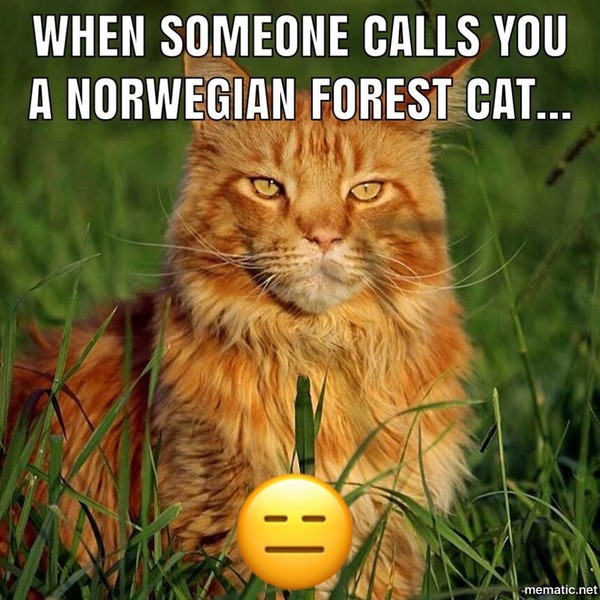
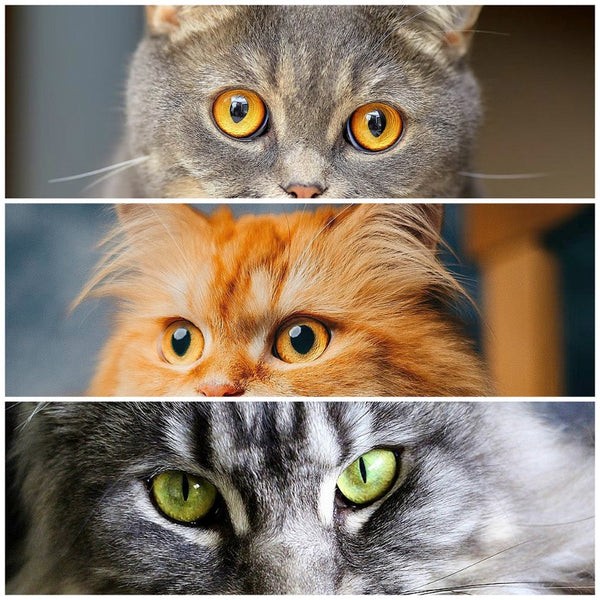
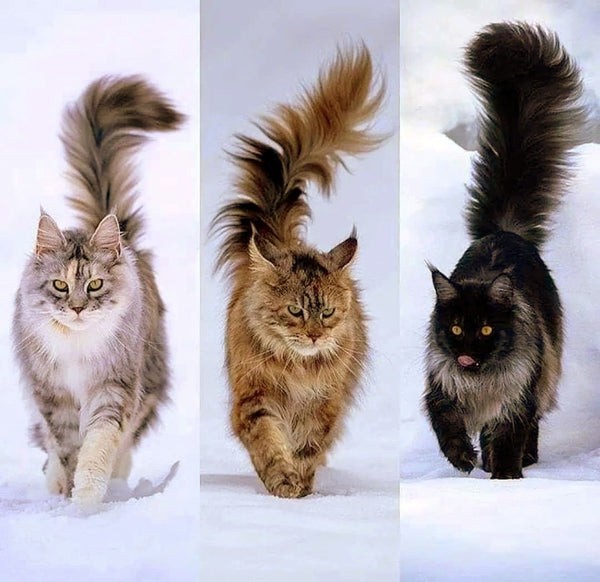
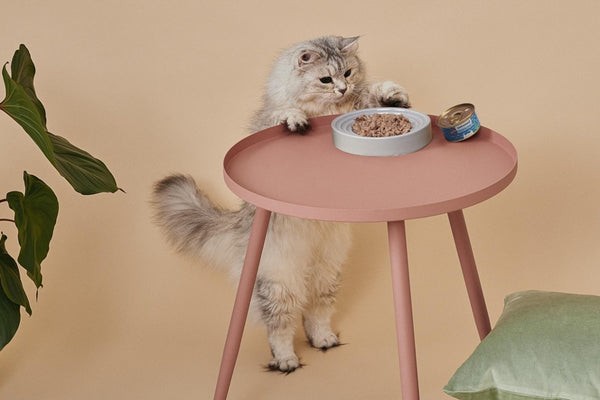
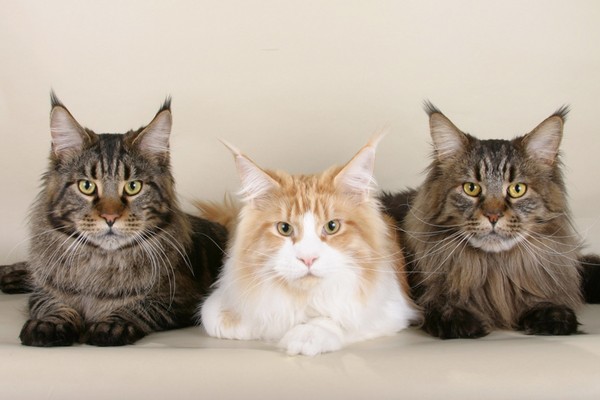
Maine Coon eyes (top) are larger and more expressive compared to regular cat eyes (bottom).
Maine Coon vs. Domestic Cat: Personality Differences
Beyond the physical distinctions, Maine Coons and regular domestic cats often exhibit different personality traits. While every cat is an individual, Maine Coons are known for certain endearing characteristics:
- Gentle and Affectionate: Maine Coons are often described as “dog-like” in their loyalty and affection towards their families. They are generally very good with children and other pets, making them excellent family companions.
- Playful and Intelligent: Despite their size, they are playful cats who enjoy interactive games and puzzle toys. Their intelligence makes them relatively easy to train, and some even enjoy learning tricks.
- Vocal but Not Demanding: Maine Coons are known to be vocal cats, but not in a constantly meowing way. They often communicate through chirps, trills, and meows, seemingly “talking” to their owners. They are less likely to be overly demanding or clingy.
- Adaptable and Social: They tend to adapt well to different environments and are generally social cats, enjoying the company of their human family and sometimes even other animals.
- Curious and Inquisitive: Maine Coons are naturally curious and enjoy exploring their surroundings. They are often found investigating new things and observing their environment with interest.
While regular domestic cats can also be affectionate, playful, and intelligent, their personalities are far more varied due to the diverse gene pool. You might find a domestic cat who is highly independent, very shy, extremely energetic, or incredibly cuddly – the personality spectrum is wide.
Caring for a Maine Coon Compared to a Normal Cat
Caring for a Maine Coon shares many similarities with caring for any cat, but their unique traits do necessitate some specific considerations.
Regular grooming is essential to maintain a Maine Coon’s thick coat.
Grooming Needs
Maine Coons, with their luxurious long coats, require more diligent grooming than short-haired domestic cats.
- Regular Brushing: Weekly brushing is crucial to prevent mats and tangles in their thick fur. During shedding seasons (spring and fall), more frequent brushing might be needed.
- Bathing: While cats are generally self-grooming, Maine Coons may benefit from occasional baths, especially to help manage shedding and dander, particularly if someone in the household has allergies.
- Dental Care: Like all cats, Maine Coons are susceptible to dental issues. Daily teeth cleaning is recommended to prevent dental disease.
- Scratching Post: Providing a tall, sturdy scratching post is important for Maine Coons to maintain healthy claws and satisfy their natural scratching instincts.
- Coat Trimming (Optional): In warmer climates or for cats who struggle with grooming, a light trim of their coat can help them stay cooler and reduce matting, but avoid shaving them completely as their coat provides insulation from both heat and cold.
Dietary Needs
Maine Coons, despite their large size, don’t necessarily require significantly different diets than other domestic cats in terms of nutrient ratios. However, quality and portion control are key.
- High-Quality Protein: Like all cats, Maine Coons are obligate carnivores and thrive on a diet rich in animal protein. Look for cat food with a high percentage of named meat sources (chicken, fish, etc.) and avoid excessive plant-based proteins or fillers.
- Moderate Fat: Healthy fats are important for coat health and energy. Omega-3 fatty acids, found in fish oils, can be particularly beneficial for their long fur.
- Low Carbohydrate: Cats are not designed to digest large amounts of carbohydrates. Choose cat foods with limited grains or grain-free options.
- Portion Control: Due to their larger size, it’s crucial to monitor their food intake to prevent obesity, which Maine Coons can be prone to. Follow feeding guidelines on the cat food packaging and adjust based on your cat’s age, activity level, and weight.
- Wet Food Preference: Many vets recommend wet food as a primary part of a cat’s diet due to its higher moisture content, which is beneficial for kidney health. This is especially important for Maine Coons, who, like many cats, may not drink enough water on their own.
Health Considerations
Maine Coons have a slightly shorter average lifespan compared to some other breeds, typically living 12-15 years, while many domestic cats can live up to 20 years. They are also predisposed to certain health conditions:
- Hypertrophic Cardiomyopathy (HCM): A heart condition that is more prevalent in Maine Coons. Genetic screening is available for breeders.
- Hip Dysplasia: A joint condition that can cause arthritis and pain. Responsible breeders screen for hip dysplasia.
- Spinal Muscular Atrophy (SMA): A genetic neuromuscular disease. Genetic testing is available.
- Polycystic Kidney Disease (PKD): Another genetic kidney disease. Screening is recommended.
Choosing a reputable breeder who screens their cats for these genetic conditions can help minimize the risk. Regular veterinary checkups are also essential for early detection and management of any health issues.
Best Food for Maine Coons
The best food for a Maine Coon is a high-quality, grain-free wet food that is rich in animal protein. Avoid foods with fillers, artificial additives, and excessive carbohydrates.
Key features to look for in Maine Coon cat food:
- High Protein Content (50% or more): Prioritize named meat sources like chicken, turkey, fish, or beef.
- Moderate Fat Content (around 20%): Look for healthy fats like fish oil or chicken fat.
- Low Carbohydrate Content (3% or less): Minimize or eliminate grains, corn, wheat, and soy.
- Essential Amino Acids: Ensure the food contains taurine and arginine, which are crucial for feline health.
- Vitamins and Minerals: A balanced formula with necessary vitamins and minerals, including Vitamin E.
Untamed wet cat food is formulated with high-quality whole meat, ideal for Maine Coons.
Untamed cat food offers excellent options for Maine Coons, with recipes formulated by vets to provide complete and balanced nutrition. Their wet food is high in protein, made with human-grade whole meat, and free from grains and artificial additives, making it a great choice to support your Maine Coon’s health and well-being.
Maine Coon Kitten vs. Regular Kitten: Growth Differences
One fascinating aspect of Maine Coons is their slow growth rate. Unlike regular kittens who reach adulthood around one year old, Maine Coon kittens continue to grow for 3 to 5 years until they reach their full majestic size.
This extended growth period has implications for their feeding needs as kittens:
- Longer Kittenhood: Maine Coon kittens require kitten food for a longer duration than regular kittens to support their prolonged growth.
- Larger Portions: They need larger meals to fuel their growth, but portion control is still important to prevent overfeeding.
- Frequent Meals: Feed Maine Coon kittens several small meals throughout the day to support their high energy levels and growth demands.
- Nutrient-Rich Kitten Food: Choose a kitten food specifically formulated for growth, with high protein, calories, and essential nutrients.
Maine Coon kittens grow at a slower pace and reach full size later than regular kittens.
Avoid relying heavily on dry food for Maine Coon kittens, as it can be calorie-dense and low in moisture. Wet food is a better option to ensure adequate hydration and protein intake during their crucial growth phase.
Conclusion: Is a Maine Coon Right for You?
Choosing between a Maine Coon and a regular domestic cat depends on your lifestyle and preferences. Maine Coons are wonderful companions for those who appreciate a large, gentle, and playful cat with moderate grooming needs and are prepared to provide a high-quality diet and be mindful of potential health predispositions.
If you are looking for a more low-maintenance cat in terms of grooming and have a less specific personality in mind, a regular domestic cat from a shelter or rescue organization can be equally rewarding. Ultimately, both Maine Coons and domestic cats offer unique joys and companionship to their human families.